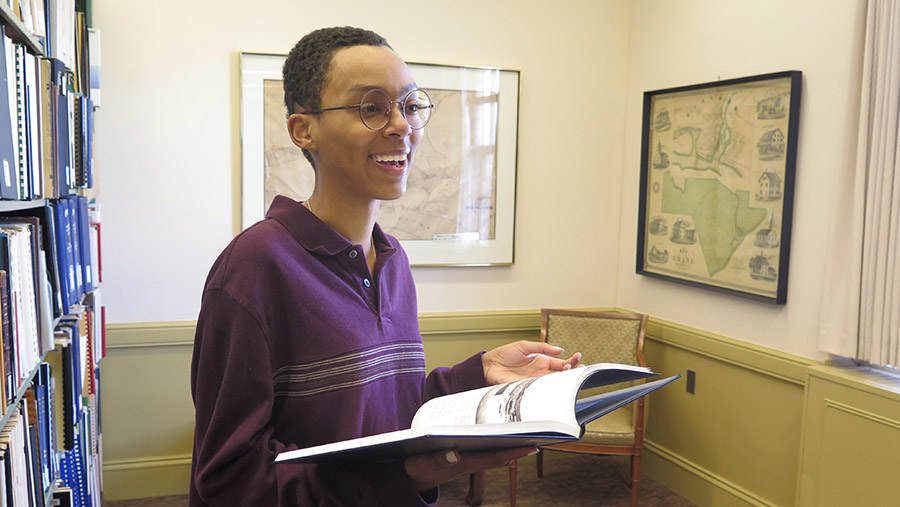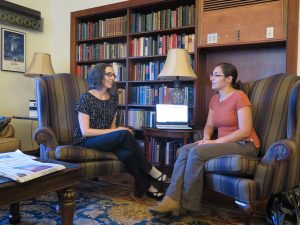
Partnering for Knowledge
Communication and Journalism Department partners with Fogler Library to embed information literacy in curriculum
By Jen Bonnet and Liliana Herakova
At the University of Maine, the introductory Public Speaking course, CMJ 103, enrolls around 500 students every semester. Most of the students are in their first year of college, and for many, this is the only communication course they will take. For that reason, the course offers a critical opportunity for students to consider what is at stake when they produce, interpret and distribute messages.
Public Speaking requires students to prepare and deliver speeches in front of live audiences. The experience can be nerve-racking. Information literacy is a set of tangible and transferable skills that help students harness their performance anxiety. By focusing on preparation and in-depth exploration of their topics, students find that their speaking confidence grows, and they become more informed and engaged community members. They also learn to appreciate oration as much more than “simply speaking” in front of others.
“Having a strong understanding of information literacy helps a public speaker with both their logos [reasoning] and ethos [speaker credibility],” says Kelsey Cole, a former Public Speaking student who is pursuing a degree in Food Science and Nutrition. “Fogler Library is a very valuable resource, especially in CMJ 103. During our CMJ 103 visits to the library, we were aided in finding credible and critical information that helped us build our speeches.”
What Cole is referring to is part of a multi-pronged integration of information literacy education into the public speaking curriculum, which was initiated by the faculty coordinator for CMJ 103 and the liaison librarian for the Department of Communication and Journalism.

A key goal of this collaboration is for learners to see themselves as consumers and creators of information. Information literacy lays a foundation for navigating the dynamic nature of information through the development of critical research skills and dispositions.
This is especially important in public speaking, where, according to longtime communication instructor Kendra Rand, “students shouldn’t just see themselves as conduits of the fruits of their sometimes reluctant research. They should imagine themselves as sources of important information for their peers. Their peers should expect credible, verifiable information. And they shouldn’t let each other down.”
The Association of College and Research Libraries would agree. Essential to information literacy is not only the “use of information in creating new knowledge” but also “participating ethically in communities of learning,” be it a class, a college campus or a community event. The public speaking course — where information is repeatedly assessed, created and shared with audiences — provides a context for practicing and reflecting on one’s participation in learning communities.
Since 2015, CMJ 103 instructors have collaborated with Jen Bonnet, the liaison librarian for the Department of Communication and Journalism, to develop a sequence of library workshops that engage students in the research process. Through interactive games, discussions and hands-on searching, students consider ways that various information sources might answer questions they have about their research topics.
For example, how might a blog from an environmental activist contribute a specific type of testimony to a speech on climate change? What types of evidence could a peer-reviewed journal article provide? In what situations might news coverage of an event or a Tweet from someone attending that event help the audience connect with a topic? Similarly, students consider ways to evaluate sources. One tool they learn to apply is the CRAAP test, used to assess the currency, relevance, accuracy, authority and purpose of a source. A series of questions related to each element of the acronym provides an entry point for students to make sense of the array of options they might encounter when researching a topic.
Students also learn how to find various sources to gather information and expand their understanding about topics that interest them, and they learn about themselves in a complex world.
“Without the library sessions, students often limit their inquiries to a Google search, which is evident in the quality of the work,” says Lisa Leaverton, an experienced communication instructor and artist.
Dana Carver-Bialer, a CMJ 103 instructor and a doctoral candidate in the Department of Communication and Journalism, added, “During the four years I’ve taught CMJ 103, students report our class being the first time they entered Fogler Library. Demystifying resources available to them and inspiring information literacy are critical parts of their UMaine experience.”
The purpose of the partnership between Fogler Library and CMJ 103 is to truly support students in growing their critical curiosity and to create a learning experience in which they see the value of accessing and sharing information as participation in a civic society. As part of the class, students work in teams to prepare and facilitate civil dialogues on controversial and complex social topics. In this context, information literacy education helps students consider information from diverse sources and reflect on processes of public opinion and their own roles as both audiences and authors. In addition to the integrated workshops described above, the CMJ 103/Library partnership has produced a number of resources including in-class activities, a workbook and an interactive library guide to support learners in both developing and assessing their information literacy.
The interactive guide for CMJ 103 is available online.
This story was originally featured in the 2018 Raymond H. Fogler Library Magazine.
